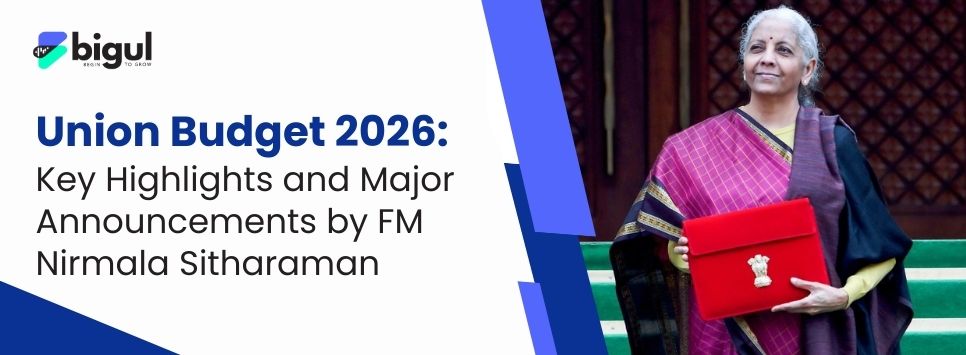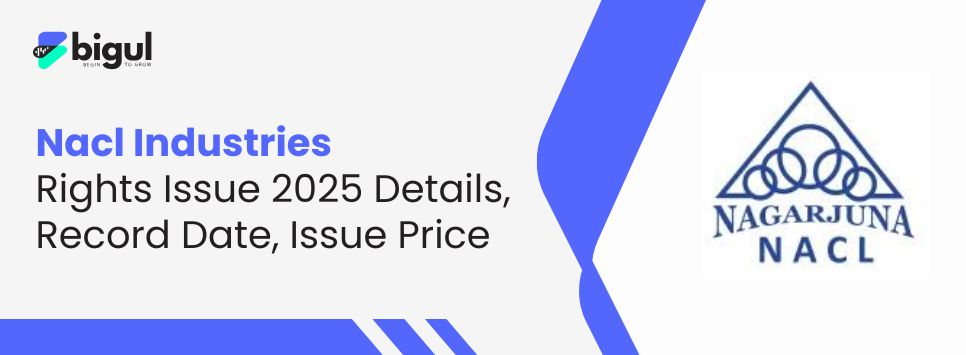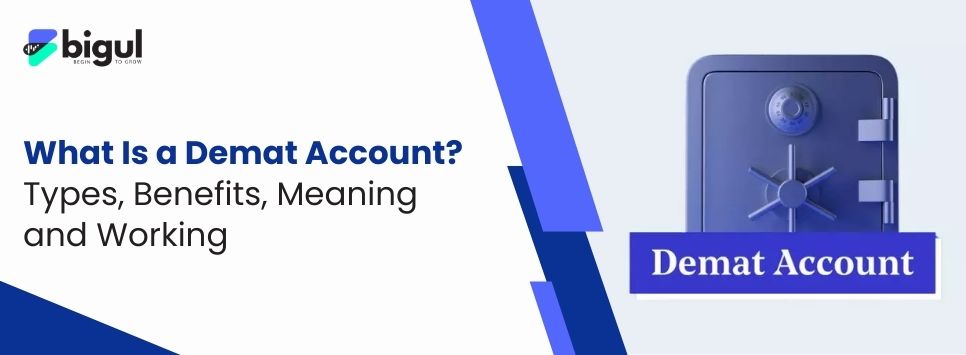Demat Account
Key Highlights:
-
A Demat (Dematerialized) account is used to hold stocks, bonds, and other securities electronically, eliminating the need for physical share certificates.
-
Demat accounts benefit investors from online trading and simplified documentation, together with heightened security properties and fast settlement times.
-
Brokers provide trading platforms, market access, research support, and help with KYC verification, making them essential for stock trading.
-
Regular Demat Account are for Indian residents, while Repatriable Demat Account (for NRIs linked to an NRE account), and Non-Repatriable Demat Account (linked to an NRO account).
What is a Demat account?
A Demat account (short for Dematerialised account, its full form) is a crucial financial instrument in India that helps investors hold stocks and securities in electronic form, fundamentally changing the meaning of Demat account from physical certificates to digital ownership. This dematerialization of shares streamlines trading by eliminating the need for handling paper, making what is a Demat account in India a cornerstone of modern investing. Essentially, a Demat account functions like a bank account, but instead of cash, it securely holds shares, bonds, and other securities (a key Demat account example being holding shares of Infosys or SBI electronically).
The importance of what is a Demat account in India cannot be overstated. These accounts create an automated system where physical certificates become obsolete, removing the risks of theft and loss associated with paper. To open a Demat account, an investor must choose a Depository Participant (DP) – typically a bank, broker, or financial institution authorized by depositories like NSDL or CDSL. This Depository Participant facilitates the dematerialization of shares and manages the account. When opening the account, individuals select a type (regular or repatriable), while NRIs often need a non-repatriable Demat account linked to an NRE bank account. It is simple, hand in your KYC papers to your preferred Depository Participant and pass the requirements and you will have your special Demat account number. Even free account opening is available with various discount brokers such as Bigul as it is a Depository Participant meaning that the user gets to reap benefits. Meanwhile, Demat accounts allows smooth online buying and selling via brokerages.
With a single Demat account, investors can manage multiple securities (another practical Demat account example), providing a comprehensive overview of their portfolio while ensuring charges remain minimal. This efficiency and security truly define the meaning of Demat account in today's digital market.
What Are the Types of Demat Accounts?
Investors must select from specific types of Demat accounts in India, each tailored to different residency statuses and financial objectives. The foundational option is the regular Demat account, designed for resident Indian to securely hold domestic securities like shares, bonds, and mutual funds. For Non-Resident Indians (NRIs) seeking to invest in the Indian market, a specialised NRI Demat account is mandatory.
This NRI Demat account category critically branches into two distinct subtypes governed by repatriation rules: the repatriable Demat account permits the transfer of investment proceeds overseas and must be linked to an NRE bank account, while the non-repatriable Demat account restricts funds within India, linking instead to an NRO bank account.
Choosing correctly between a repatriable Demat account and a non-repatriable Demat account is essential for NRIs to align with their cross-border financial strategies. Understanding these core types of Demat accounts in India ensures compliance and optimal investment management.
How Does a Demat Account Work?
A dematerialized account or demat account is an essential instrument in India, functioning as a central electronic repository that facilitates the holding of securities. This account eliminates the need for physical share certificates by securely storing shares digitally. Crucially, understanding the demat vs trading account distinction is key: while the demat account holds securities, a linked trading account is used to execute buy/sell orders in the market.
When an investor wishes how to open a demat account, they must navigate the standard demat account opening process. This demat account opening process requires submitting the necessary documents required for demat account (proof of identity, address, PAN, bank details) to a Depository Participant (DP). The demat account working mechanism involves credits (when you buy or receive shares) and debits (when you sell or transfer shares) to this electronic holding. This seamless demat account working mechanism underpins modern trading.
There are typically two types: a regular demat account for residents and a repatriable demat account for NRIs. Free demat account opening offers vary, but basic accounts might waive initial fees. Understanding how to open a demat account and the associated charges is vital.
For investors, a demat account is crucial. It simplifies trading, enhances safety, and offers benefits like immediate settlement and easier management of multiple securities from one place. The efficiency of the demat account working mechanism and the clear separation from the trading account (the demat vs trading account setup) are fundamental to this security and ease. Ensuring you have all documents required for demat account ready streamlines the initial setup.
What are the Benefits of a Demat Account?
In the realm of investment and trading, a dematerialised account has revolutionised how individuals engage with financial markets. When you open a demat account, you access a secure digital repository that holds your investments electronically. The advantages of a demat account are fundamental, as participation in today's equity markets is virtually impossible without one.
Presence of a demat account allows effortless transformation of already existing physical certificates to electronic ones symbolizing actual paperless trading and carrying the privilege of a huge descent of forgery and theft which occurs with paper records.
The ability to transfer shares electronically between accounts streamlines processes considerably.
Key demat account benefits and features include paperless trading, the elimination of physical theft risks, instant settlement of trades, and unparalleled ease of shareholding by consolidating diverse securities. The convenience of opening an account online has made investment accessibility unprecedented.
Understanding what kind of demat account suits your goals is crucial. New offerings often feature zero opening charges with minimal maintenance fees.
The advantages of a demat account extend to systematic investment tracking and efficient fund transfers to linked bank accounts. The security, epitomized by a reduced risk of forgery and theft, exemplifies how technology transforms investing. For queries about demat account benefits and features or strategies, consulting advisors is recommended. The flexibility offered by brokers, including credit facilities, complements these core benefits.
Documents Required to Open a Demat Account
To open a demat account, one must submit KYC documents along with the income proof. Below are the list of Key documents required to open a demat account with a discount broker under NSDL or CDSL.
1. Proof of Identity (POI)
Any of the following government-issued identity proofs with a photograph can be submitted:
-
PAN Card (mandatory for all applicants)
-
Aadhaar Card
-
Voter ID
-
Passport
-
Driving License
2. Proof of Address (POA)
A valid address proof is required to open a demat account :
-
Aadhaar Card
-
Passport
-
Voter ID
-
Utility Bills (Electricity, Gas, or Telephone – not older than 3 months)
3. Proof of Income (For trading in derivatives)
-
Salary Slips
-
Income Tax Returns (ITR)
-
Bank Statement (with last 6 months’ transactions)
4. Passport-Sized Photographs
Most Depository Participants require recent passport-size photographs for verification.
5. Bank Proof
-
Cancelled Cheque
-
Bank Passbook Copy
By submitting these documents, one can easily open a demat account and start trading in the Indian stock market.
Who should open a Demat account, And Is It necessary to Open It For Trading?
In the realm of investment and trading, a dematerialised account has revolutionized how individuals engage with financial markets. When you open demat account, you access a secure digital repository that demat account holds your investments in electronic format. The importance of demat account cannot be overstated in modern financial transactions as without a demat account, participation in today's equity markets is virtually impossible.
A demat account allows investors to seamlessly convert physical certificates into electronic form and vice versa, eliminating risks associated with paper documents. The ability to transfer shares from one demat account to one demat account to another electronically has streamlined investment processes considerably. Demat accounts offer several benefits including reduced paperwork, elimination of theft risks, and instant settlement of trades. The convenience of opening a demat account online through a simple account opening form has made investment accessibility unprecedented.
When considering what type of account to choose, investors should evaluate various options. A new type of demat account introduced by many brokerages offers zero demat account opening charges with a minimal annual maintenance charge. Understanding what kind of demat account suits your investment goals is crucial. Demat account details typically include custody information, transaction history, and portfolio valuation.
Demat account helps investors track their investments systematically, and when you get your demat account, you gain the ability to transfer money from a demat account to linked bank accounts efficiently. The convenience that a demat account has made possible exemplifies how technology has transformed investment practices. If you need a demat account or have questions about how a demat account need affects your investment strategies, consulting with financial advisors is recommended. Demat accounts and credit facilities offered by brokers provide additional flexibility for investors.
What is a joint Demat account?
A joint Demat Account is a type of Demat account which allows various individuals to manage securities together It works as a single demat account, but instead of having one holders it can have up to three holders. This account helps in holding stocks, bonds, Mututal funds, ETFs and other securities electronically.
In a Joint demat account, the main holder is responsible for all the transactions while the secondary holders share ownership. Meanwhile the authorisation to sell or transfer the securities typically depends on all the shareholders permission. This type of shared demat account is beneficial for families, busniess partners or spouses who want to invest together.
To open a Joint Demat Account, all holders must complete the Know Your Customer (KYC) process, provide identity and address proof, and submit relevant documents to a Depository Participant (DP) registered with NSDL or CDSL. The joint account holders must operate the account based on the agreed mode of operation, which could be jointly or on a survivor basis.
A Joint Demat Account helps in estate planning while managing portfolios and ensuring easy security transfers when an account holder passes away. Tax regulations along with legal requirement,s need attention because capital gains and dividend income belong to the main account holder for tax purposes.
Do We Need Brokers to Open a Demat Account?
Yes, a broker is required to open a Demat account, but not in the traditional sense. Demat accounts function under a Depositary Participant (DP) with membership from either NSDL (National Securities Depository Limited) or CDSL (Central Depository Services Limited). According to regulations a Demat account can be created at any of the many stockbrokers and banks and financial institutions that serve as Depository Participants.
However, a broker is essential when an investor wants to buy or sell stocks in the stock market. A Demat account only holds securities electronically, while a trading account is needed to execute transactions. Stockbrokers, also known as brokerage firms, provide the trading platform required to place buy and sell orders in the market.
How Brokers Help in Demat Account Opening?
Integrated Services – Most brokers offer a 2-in-1 account, combining Demat and trading accounts, making transactions seamless.
KYC Verification – Brokers assist in the Know Your Customer (KYC) process, ensuring compliance with SEBI regulations.
Market Access – A broker provides trading platforms and tools for real-time stock market access.
Research & Support – Many brokerage firms offer investment advice, stock analysis, and customer support.
While a Demat account can be opened with a DP, a broker is necessary for stock trading. It makes them an integral part of the investment journey.
Conclusion
Investors need a Demat account as a main tool to manage electronic securities trading in stock market. The storage of share certificates in electronic form brings better security along with decreased paperwork and fast business transactions. A vital choice of Demat account type exists for all investors including retail clients and NRI holders and members of joint investment groups.
Online discount stockbrokers provide hassle-free trading platforms that come with research tools and unified services making Demat account creation and maintenance effortless.
FAQs
1. Can I open a Demat account without a broker?
No, while a Depository Participant (DP) provides the Demat account, a broker is required for stock trading.
2. What are the charges for opening a Demat account?
Some brokers offer free Demat account opening, but there may be annual maintenance charges and transaction fees.
3. Can NRIs open a Demat account in India?
Yes, NRIs can open a Repatriable or Non-Repatriable Demat account linked to their NRE/NRO bank account.
4. What documents are required to open a Demat account?
PAN card, Aadhaar, proof of address, income proof (for derivatives trading), and passport-size photos.
5. Can I have multiple Demat accounts?
Yes, you can open multiple Demat accounts with different brokers, but each must be linked to a unique trading account.
6. What happens to my Demat account if I don’t use it?
Inactive Demat accounts may get frozen due to SEBI regulations, and reactivation requires fresh KYC verification.

.jpg)

.jpg)




.jpg)


